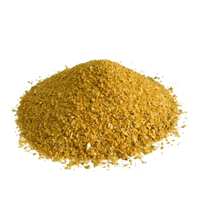Alcohol bard

| Mass fraction of moisture,%, not more than: | 10,0 |
| Mass fraction of crude protein (in terms of absolutely dry substance),%, not less | 20,0 |
| Mass fraction of crude fiber (in terms of absolutely dry substance),%, not more than | 20,0 |
| Mass fraction of crude ash (in terms of absolutely dry substance),%, not more than | 10,0 |
| Size: in loose form: - the residue on the sieve with holes with a diameter of 5 mm - residue on the sieve with holes with a diameter of 2 mm,%, not more than in the form of granules: - diameter of granules, mm - length of granules, mm - pass through a sieve with holes with a diameter of 3 mm,%, not more than | Not allowed 5,0 5— 13 No more than two diameters 5,0 |
| The content of metallomagnetic impurities: - particles up to 2 mm inclusive, mg / kg, not more than - particles larger than 2 mm and with sharp cutting edges | 30,0 Not allowed |
| Content of feed units per 100 kg, not less | 86 |
| Exchange energy, MJ / kg (kcal / 100 g), not less: for birds for pigs for cattle | 9,0 9,55 10,76 |
Thanks to modern advanced industry, we have been able to successfully conduct non-waste production. Today, waste is often more in demand than the original raw materials.
For example, take sugar beets. Crystalline sugar is made from it, and cake and molasses remain as waste. After fermentation of molasses, ascorbic acid, ethyl alcohol and other residues are obtained. After cleansing the mass from acid and ethanol, alcohol bard is obtained.
The long way traveled results in a product that is quite in demand for imports to Europe, Asia and the USA.
From bards mainly produce:
- Food additives in animal feed.
- High-quality fertilizers.
- Biofuel (gas).
- Marinated seafood.
Features alcohol bard
By itself, sulfite-alcohol bard is quite a toxic product, has a sharp and unpleasant sour smell. In its pure form, it must be disposed of in a special way. But the disposal problem was difficult to solve due to the low solids content.
Today, the bard is not disposed of, but is sent in full for processing, where the product is cleaned and the proportion of dry matter is increased by 6-7 times, then fertilizers and feed mixtures are enriched with it.
Selling bards for export is a cost-effective solution, since it is cheaper to sell it or produce a new product than to recycle. Recycling alcohol bards takes time, but the result of its use exceeds expectations.
Due to the fact that we have learned to recycle a product that is very difficult to dispose of, we can increase the income from the production of alcohol.
Use of alcohol bard
The original pure bard has an aggressive composition, where dry matter does not exceed 6%. After processing, the dry part is increased to 40% and it becomes possible to include it in the composition of the food additive and plant food.
As it turned out, the product has wide application, but you need to be very careful with it. It is highly susceptible to mold and rotting. She has a rather short shelf life within which the bard should be used.
There is a way to extend the shelf life by adding biocides to the liquid. But such a solution is not safe as a component in the production of feed mixtures. This is dangerous due to the fact that the component penetrates into the composition of milk, eggs, the immunity of the animal decreases, even to death.
The waste contains a high concentration of protein, fiber, carbohydrates and trace elements, which make it an excellent biological additive to the full animal diet.
Adjusting your production on the basis of bards, it is important not to be indifferent to the method and shelf life, and in time to produce it into the right products.
Production of bard
The company "AGRO-V" provides the opportunity to buy alcohol bard wholesale from the manufacturer. Regular wholesale deliveries around the world make it easy to get the goods in your region. All products are certified and undergoes continuous laboratory testing.
The total price of the product is calculated individually for each customer based on its location and order quantity.
Delivery is possible to such countries as Austria, Belgium, Bulgaria, Great Britain, Hungary, Germany, Greece, Denmark, Ireland, Spain, Italy, Cyprus, Latvia, Lithuania, Luxembourg, Malta, the Netherlands, Poland, Portugal, Romania, Slovakia, Slovenia, Finland, France, Croatia, Czech Republic, Sweden and Estonia, Canada, USA, Australia.
We are open to mutually beneficial cooperation!






